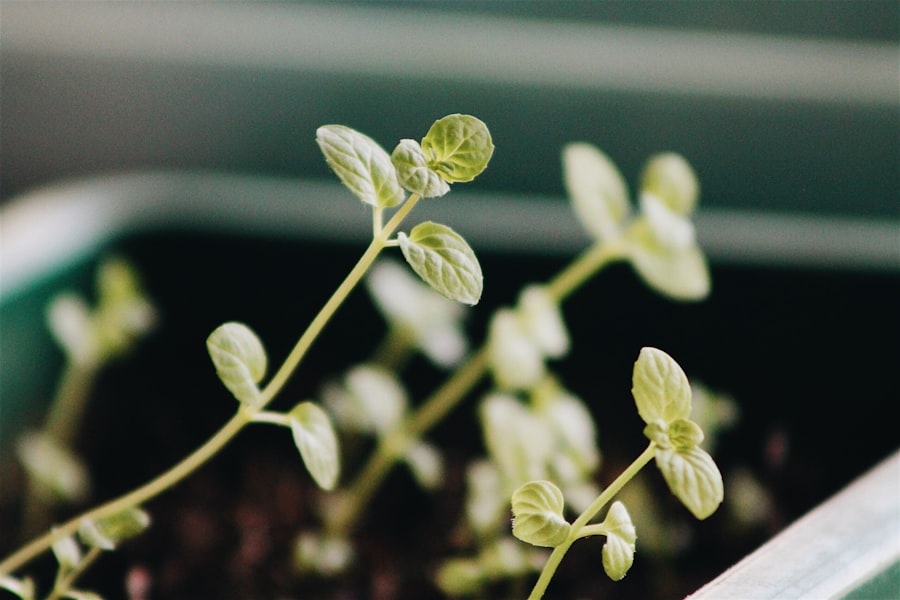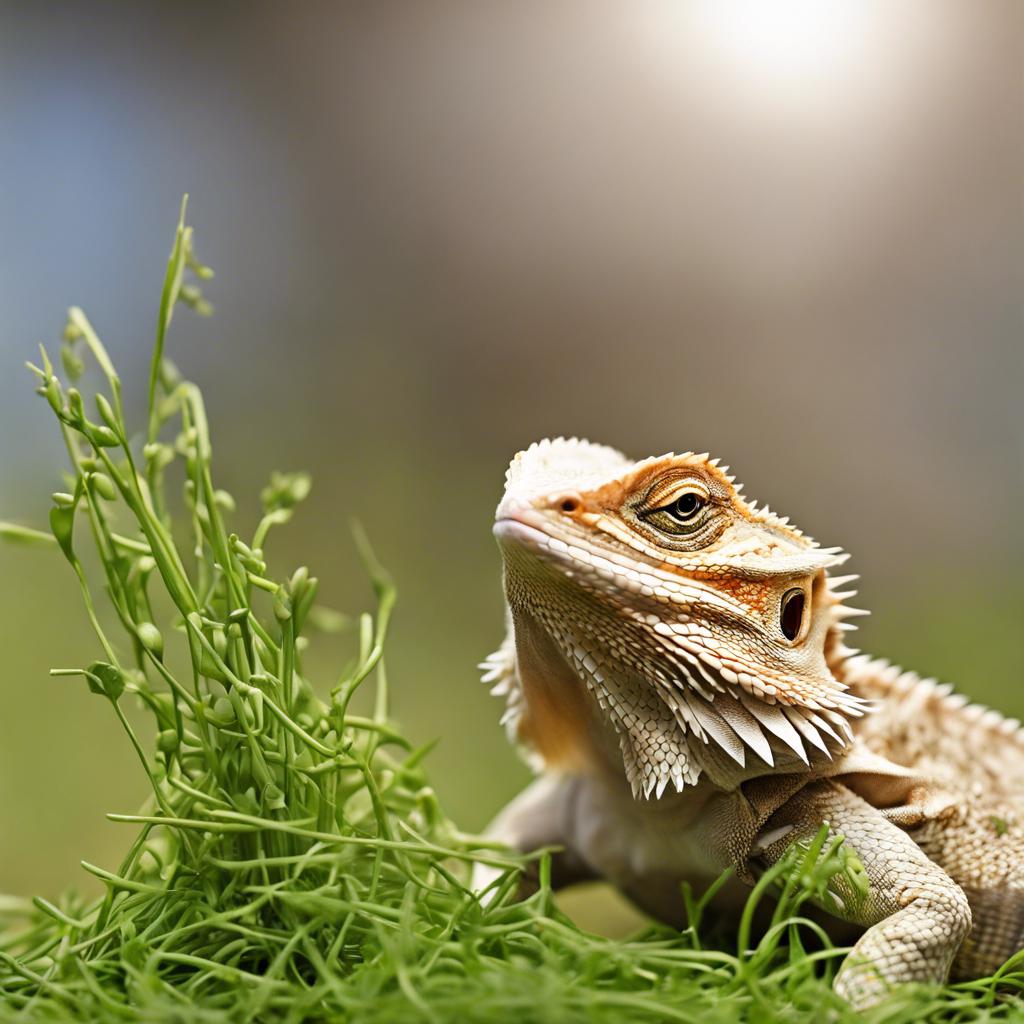Bearded dragons are popular reptile pets known for their unique appearance and docile nature. These lizards are native to Australia and have become increasingly popular as pets around the world. Bearded dragons are relatively easy to care for and can make great companions for reptile enthusiasts.
One of the most important aspects of caring for a bearded dragon is providing them with a proper diet. Nutrition plays a crucial role in the overall health and well-being of these reptiles. A balanced diet that meets their specific nutritional needs is essential for their growth, development, and longevity.
Key Takeaways
- Bearded dragons are popular pets that require a balanced diet to maintain their health.
- Alfalfa sprouts are a type of vegetable that can be included in a bearded dragon's diet.
- Alfalfa sprouts are a good source of protein, fiber, and vitamins for bearded dragons.
- However, feeding too many alfalfa sprouts can lead to health problems such as kidney stones.
- It is important to prepare alfalfa sprouts properly and offer a variety of other vegetables and fruits to ensure a balanced diet for bearded dragons.
Nutritional Needs of Bearded Dragons
Bearded dragons require a variety of nutrients to thrive. These include protein, calcium, vitamins, and minerals. Protein is essential for muscle growth and repair, while calcium is necessary for bone health. Vitamins and minerals are needed for various bodily functions and overall health.
A balanced diet for bearded dragons typically consists of a combination of insects, vegetables, and fruits. Insects such as crickets, mealworms, and dubia roaches provide a good source of protein. Vegetables like collard greens, kale, and squash are rich in vitamins and minerals. Fruits like berries and melons can be given as occasional treats.
What are Alfalfa Sprouts?
Alfalfa sprouts are young shoots of the alfalfa plant that are harvested before they develop into full-grown plants. These sprouts are commonly used in salads, sandwiches, and other dishes as a crunchy and nutritious addition. Alfalfa sprouts have a mild flavor and are packed with various nutrients.
Can Bearded Dragons Eat Alfalfa Sprouts?
Yes, bearded dragons can eat alfalfa sprouts. In fact, alfalfa sprouts can be a beneficial addition to their diet. These sprouts provide a good source of fiber, vitamins A, C, and K, as well as minerals like calcium and iron. However, it is important to feed alfalfa sprouts in moderation and as part of a balanced diet.
Benefits of Alfalfa Sprouts for Bearded Dragons
Alfalfa sprouts offer several benefits for bearded dragons. Firstly, they are a good source of fiber, which aids in digestion and helps prevent constipation. The high vitamin content in alfalfa sprouts can also contribute to the overall health and immune function of bearded dragons.
Additionally, alfalfa sprouts contain calcium, which is crucial for the development and maintenance of strong bones in bearded dragons. Calcium deficiency can lead to metabolic bone disease, a serious condition that can affect the overall health and mobility of these reptiles.
Risks of Feeding Alfalfa Sprouts to Bearded Dragons

While alfalfa sprouts can be beneficial for bearded dragons, there are some potential risks to consider. One concern is the possibility of bacterial contamination. Alfalfa sprouts have been associated with outbreaks of foodborne illnesses in humans, so it is important to ensure that the sprouts are fresh and properly washed before feeding them to your bearded dragon.
Another risk is the high protein content in alfalfa sprouts. While protein is an important part of a bearded dragon's diet, too much can lead to kidney problems and other health issues. It is important to feed alfalfa sprouts in moderation and as part of a balanced diet that includes other sources of protein.
How to Prepare Alfalfa Sprouts for Bearded Dragons
To prepare alfalfa sprouts for your bearded dragon, start by selecting fresh sprouts from a reputable source. Rinse the sprouts thoroughly under running water to remove any dirt or bacteria. You can also soak them in a solution of water and vinegar for a few minutes to further reduce the risk of bacterial contamination.
Once the sprouts are clean, you can offer them to your bearded dragon as a snack or mix them with other vegetables as part of a salad. It is important to monitor your bearded dragon's response to the sprouts and make sure they are eating them without any issues.
Other Vegetables and Fruits Suitable for Bearded Dragons
In addition to alfalfa sprouts, there are many other vegetables and fruits that bearded dragons can eat. Some suitable vegetables include collard greens, kale, mustard greens, dandelion greens, and butternut squash. Fruits like berries, melons, and apples can be given as occasional treats.
It is important to provide a variety of vegetables and fruits to ensure that your bearded dragon receives a wide range of nutrients. Bearded dragons have different preferences when it comes to food, so it may take some trial and error to find out which vegetables and fruits your pet enjoys the most.
Bearded Dragon Care Tips
Taking care of a bearded dragon involves more than just providing them with a proper diet. Here are some general tips for caring for these reptiles:
1. Provide a suitable habitat: Bearded dragons require a spacious enclosure with proper lighting, heating, and humidity levels. The enclosure should also include hiding spots, basking areas, and a substrate that is safe for them to walk on.
2. Maintain proper temperature: Bearded dragons are ectothermic animals, which means they rely on external heat sources to regulate their body temperature. It is important to provide a temperature gradient in their enclosure, with a basking spot that reaches around 95-105°F (35-40°C) and a cooler area around 75-85°F (24-29°C).
3. Offer regular baths: Bearded dragons enjoy soaking in water and it can help with shedding and hydration. Provide a shallow dish of water for them to soak in a few times a week.
4. Handle with care: Bearded dragons can become stressed if handled too frequently or roughly. When handling them, be gentle and support their body to avoid causing any harm or discomfort.
5. Regular veterinary check-ups: It is important to take your bearded dragon to a reptile veterinarian for regular check-ups and to address any health concerns. A veterinarian can also provide guidance on proper nutrition and care for your pet.
Can Bearded Dragons Eat Alfalfa Sprouts?
In conclusion, bearded dragons can eat alfalfa sprouts as part of a balanced diet. These sprouts offer several benefits, including fiber, vitamins, minerals, and calcium. However, it is important to feed alfalfa sprouts in moderation and ensure that they are fresh and properly washed to reduce the risk of bacterial contamination.
Providing a varied and nutritious diet is crucial for the overall health and well-being of bearded dragons. In addition to alfalfa sprouts, there are many other vegetables and fruits that can be included in their diet. It is important to monitor your bearded dragon's response to different foods and make adjustments as needed.
Remember to consult with a reptile veterinarian for specific dietary recommendations and to ensure that you are providing the best care possible for your bearded dragon. With proper nutrition and care, these fascinating reptiles can live long, healthy lives as beloved pets.
If you're wondering whether bearded dragons can eat alfalfa sprouts, you might find this article on Reptile Wizard's website helpful. It discusses the safety of various foods for bearded dragons, including alfalfa sprouts. To learn more about this topic, check out the article here.
FAQs
What are alfalfa sprouts?
Alfalfa sprouts are young shoots of the alfalfa plant that are commonly used in salads and sandwiches.
Can bearded dragons eat alfalfa sprouts?
Yes, bearded dragons can eat alfalfa sprouts in moderation as part of a balanced diet.
What are the nutritional benefits of alfalfa sprouts for bearded dragons?
Alfalfa sprouts are a good source of protein, fiber, vitamins A, C, and K, and minerals such as calcium and iron.
How should alfalfa sprouts be prepared for bearded dragons?
Alfalfa sprouts should be thoroughly washed and chopped into small pieces before feeding to bearded dragons.
Can feeding too many alfalfa sprouts be harmful to bearded dragons?
Feeding too many alfalfa sprouts to bearded dragons can lead to digestive issues such as bloating and diarrhea. It is important to feed them in moderation as part of a balanced diet.

